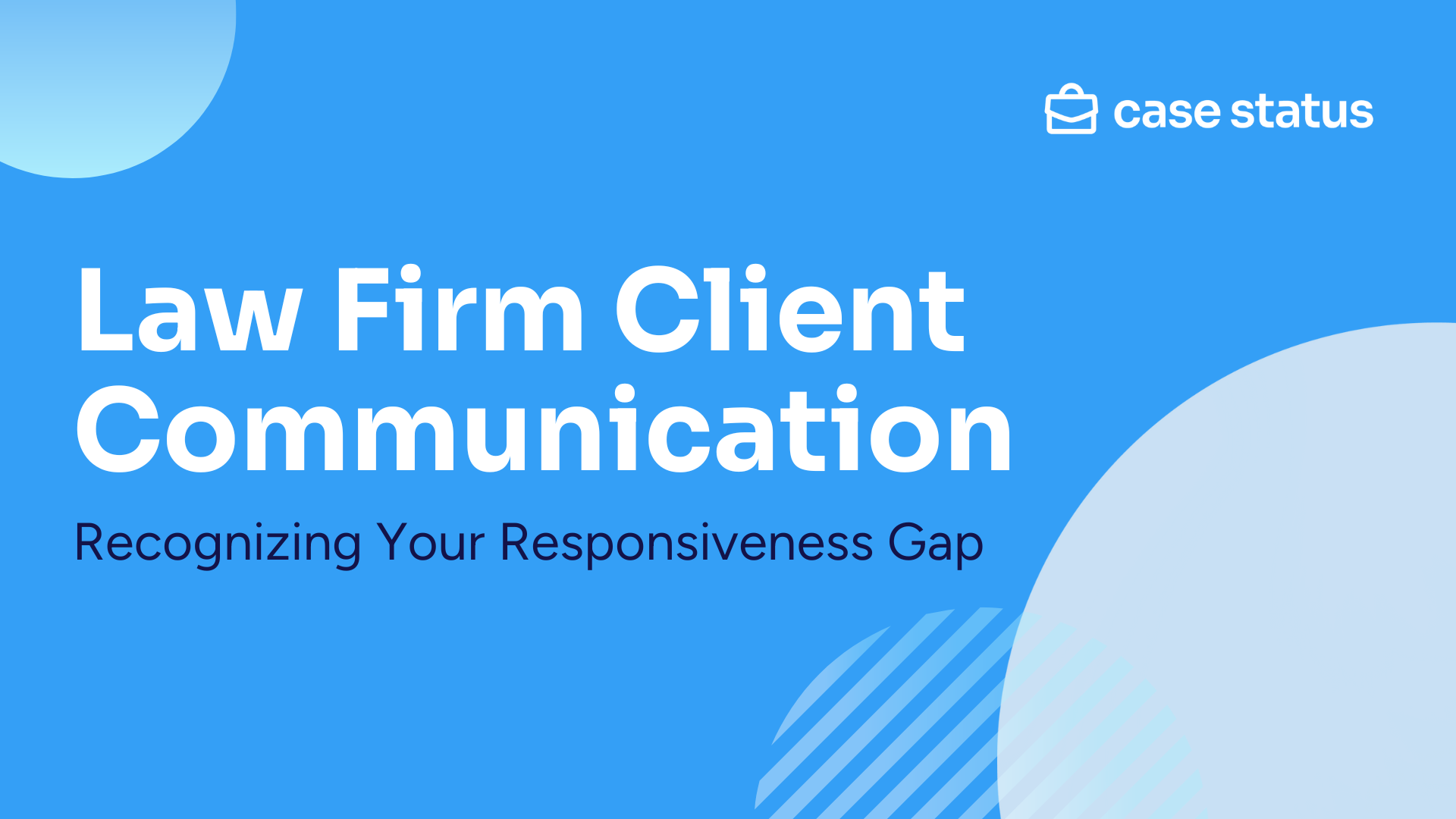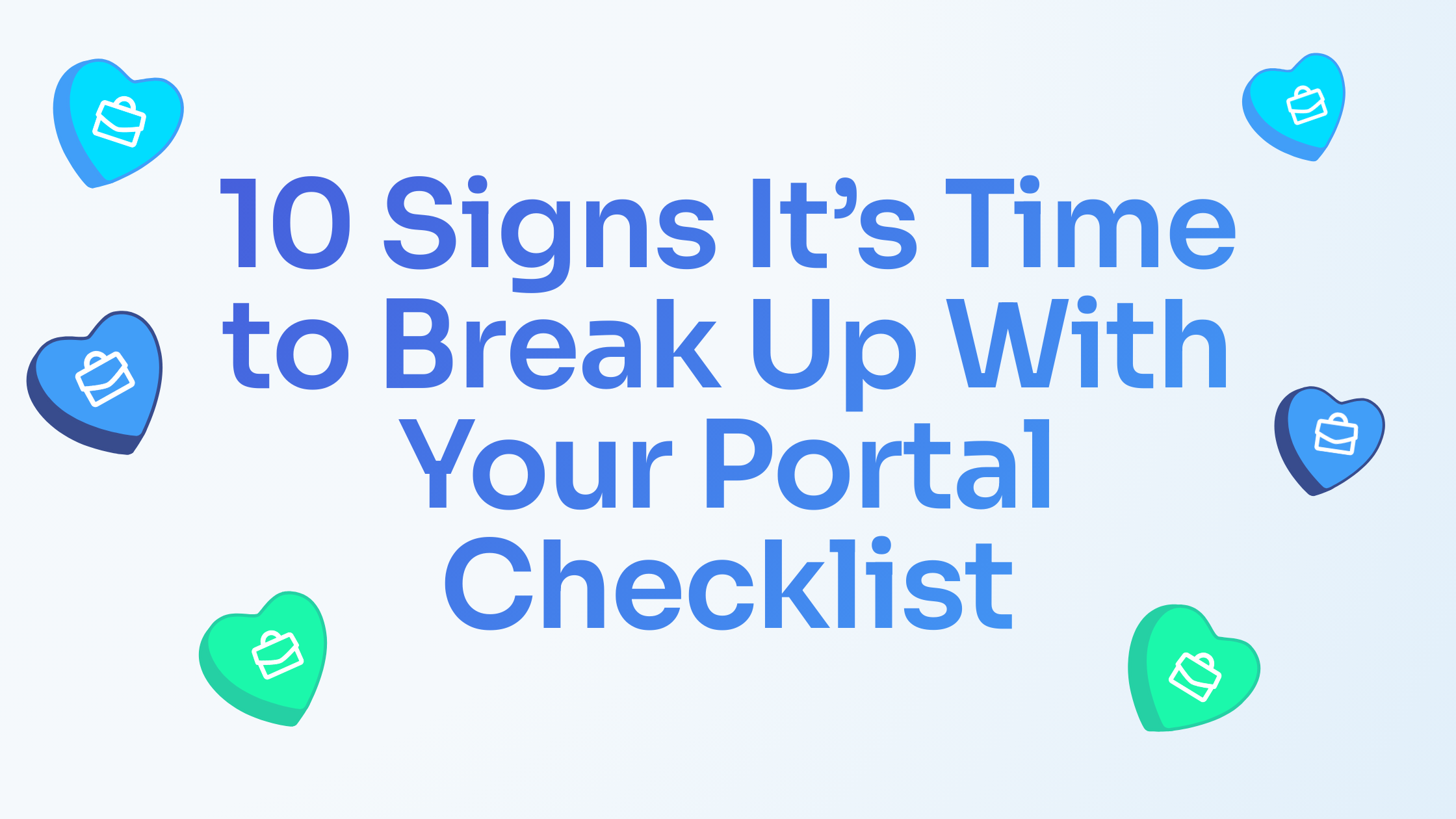
Technical expertise and legal strategy are top skills for many attorneys. However, client communication skills are just as critical for maintaining a healthy bottom line and attracting new referrals. But with heavy caseloads and complex legal processes, providing consistent and reliable client communication can be a challenge for even the most skilled attorneys.
The result is that law firms may suffer from a perceived communication gap where they fail to meet clients’ basic communication expectations. For example, Case Status’ 2025 Legal CX Report found that a mere 9% of firms offer a self-serve app for clients despite those clients spending five hours per day on their smart devices.
By relying on outdated communication methods, like phone and email, law firms may fail to meet clients where they are and may be creating unnecessary barriers to fostering stronger attorney-client relationships. Even worse, these outdated communication modes can create extra work for team members that could otherwise be spent on more high-value tasks.
The good news is that closing the communication gap isn’t difficult. We’ll look at six strategies you can implement today to build a more client-centric culture and help boost your firm’s growth.
Set expectations During Intake
The intake process offers a unique opportunity to establish clear communication rules. This way, you can make a favorable first impression and set the tone for the entire attorney-client relationship. Clarity is key during the initial meeting to ensure clients understand what they can expect in terms of communication.
Make sure you outline your firm’s preferred contact methods, such as email, phone, or a secure messaging platform. Provide specific response timeframes and update frequencies clients should expect.
You can use our communication frequency calculator to determine the ideal frequency of updates for your firm.
Also, be sure to communicate when you’ll be available for calls and emails, and clarify what case milestones clients can expect to hear about and when.
By understanding what legal clients want, you’ll be able to set clear boundaries and expectations while ensuring clients feel included and valued.
Be Transparent and Honest
Being honest and transparent is how attorney-client relationships are built. Most clients may not expect you to guarantee a certain result. However, they may expect you to be clear about what challenges their cases face alongside the most realistic outcomes.
Setting realistic expectations for outcomes is especially important for practice areas where results can vary significantly, case by case, such as immigration or personal injury law.
Try to frame conversations around possible outcomes and factors that tend to be most important. Be clear with clients that results can never be guaranteed. And when obstacles arise, communicate them to the client and explain how they may affect the legal strategy.
When a case doesn’t go as you wanted, you’ll need to deliver the bad news with finesse. Explain the reasons for the outcome as well as what options they have moving forward. At the same time, you’ll want to show you’re being proactive in finding solutions.
Part of your law firm CX strategy should cover having conversations with clients about poor results. Incorporating a client feedback tracker can also help you identify areas for improvement.
For example, you can automatically solicit feedback during case milestones to better understand how to build and manage relationships with clients during these critical conversations.
Listen First, Talk Second
You may wonder: What do clients want most from their lawyers? High on the list is an attorney who actively listens to clients to better understand their needs, concerns, and expectations.
This means you don’t want to jump to conclusions about a client’s case or the best legal strategy. Instead, be intentional about listening to the client.
You want to make sure you’re both on the same page. This can be done by asking open-ended questions, such as: “What concerns do you have about the legal process?” or “What does a successful resolution of the case look like to you?”
Open-ended questions often invite clients to share their concerns. More than that, they can help build trust between you and your clients.
When responding to clients, practicing reflective listening can go a long way in building trust. Reflective listening means you paraphrase what the client has just told you in order to confirm you understand. For example, for a client going through a divorce, you may say, “It sounds like your main goal is to continue living in your current home, is that correct?”
You can also learn how to improve client experience with legal technology. For example, by requesting feedback from clients and offering a 24/7 messaging portal, you give clients the opportunity to share their thoughts and concerns. This proactive approach can demonstrate concern for their needs and your willingness to accommodate their schedules.
Use Secure Messaging Channels
One of the best ways to enhance client communication in a legal practice: offer a direct messaging channel clients can access 24/7. However, the convenience of direct messaging must not come at the expense of security, especially for law firms where attorney-client privilege is non-negotiable.
A secure client messaging system should provide encrypted communication channels for clients to reach out to you safely. When choosing a mobile client portal for your law firm, verify that it complies with legal confidentiality requirements. Ensure you also train your team on standard practices for communicating securely and how to avoid accidental breaches.
For example, you’ll want to establish clear protocols for handling sensitive information through direct messaging. Ensure your team and clients understand which documents and information can be shared digitally and which are better reserved for a phone call or in-person meeting.
The best client portals for law firms put security at the center of their platforms. Whichever platform you use, verify it complies with industry regulations, such as the General Data Protection Regulation (GDPR) or Health Insurance Portability and Accountability Act (HIPAA).
Prioritizing security in messaging isn’t just good practice; it can also help build your attorney-client relationship, as it shows your dedication to keeping your clients’ sensitive information safe.
Keep Your Language Simple and Concise
Legal jargon can quickly intimidate clients and create a wall between you and them. Terms like “discovery” and “fiduciary duty” may be common and easily understood to you. But for your clients, they can come across as complex and confusing.
Translating complex legal terms into plain English is an essential skill for the most effective attorneys. You can do this by trying to break complex ideas into short, digestible sentences that use a direct and active voice.
For example, instead of saying “We’re going to file a motion for summary judgment,” you can say, “The facts in your case are undisputed, so we’re going to ask the judge to rule in our favor without going to trial.” This sort of language makes the legal terms easy to understand without oversimplifying essential information.
You can also use technology to help translate legal definitions and terms into plain English. For example, legal apps for clients allow clients to access case information in easy-to-understand English. They can even translate messages from your firm into other languages, which may further enhance communication.
Keep Detailed Logs of Previous Communications
Cases can span years and accumulate hundreds or even thousands of pages of documents and communications. Because of the sheer volume of communication along with the extended timeline, keeping track of everything can be challenging.
On top of that, team members may change during the course of a case. This can further complicate your ability to keep track of and summarize that particular case.
Keeping a detailed log of every client interaction, such as phone calls, emails, and in-person meetings, can go a long way in keeping communications organized.
Using client relationship management (CRM) software and maintaining communication on that software as much as possible can also make logging this information much easier. When communications are properly logged, they can more easily be referenced by any team member.
Learn more: Why law firms need a CRM
However, even if you’ve done an excellent job of maintaining records of client communications, trying to manually synthesize all of the information in those records can be difficult.
That’s why it’s a good idea to automate client case management. With it, you can rely on AI and legal technology to log and summarize large volumes of communication.
For example, with Case Status’s AI Case Summaries feature, you can quickly get a summary of the case based on saved records. This can help you stay informed and up-to-date while saving you many hours of research.
Transform Your Law Firm Through Strategic Client Communication Management
Closing the gap between how your clients expect to communicate and how you’re currently communicating can have a transformative impact on your law firm. These changes have the potential to drastically improve client satisfaction, yet they don’t need to be difficult to implement.
Adapting simple, straightforward improvements, like setting clear expectations during intake and using secure messaging platforms, can translate into measurable improvements. Clients typically feel more valued, attorney-client relationships may be strengthened, and retention and referral rates can increase.
With the competition increasingly looking for ways to attract new clients, your law firm’s future growth may depend on prioritizing client satisfaction through improved communication. By being proactive and implementing systematic changes today, you can give your firm an advantage in a competitive market.

.png)

